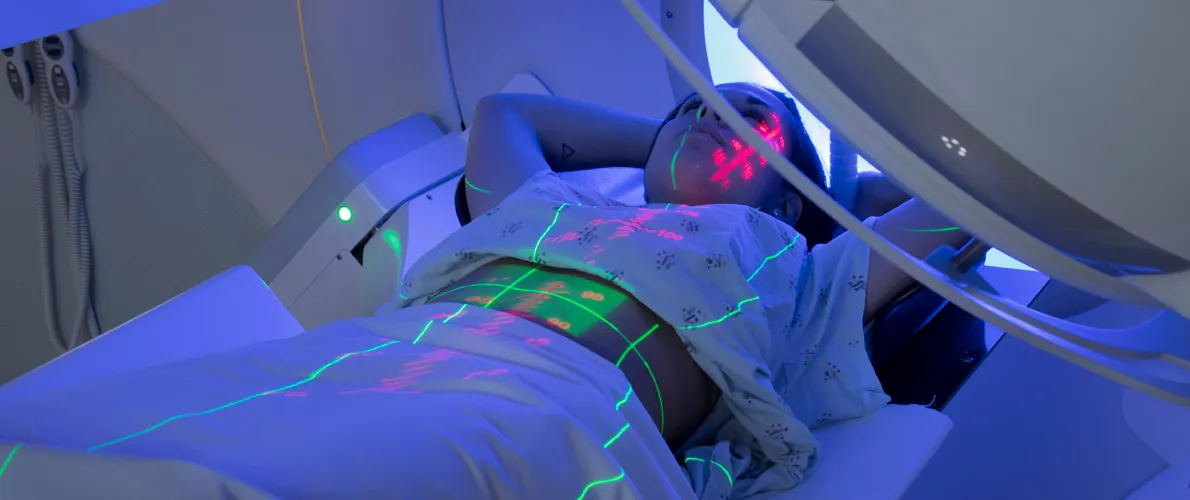Main Content
Master of Science in Medical Dosimetry

A Medical Dosimetrist is a vital member of a radiation oncology team who collaborates with radiation therapists, medical physicists, and radiation oncologists, to design, generate, calculate, and measure radiation dose distributions for oncology patients in alignment with their physician’s prescribed treatment plan.
Whether you’re seeking a career in Medical Dosimetry (Track 1) or are currently a certified, practicing Medical Dosimetrist seeking an advanced degree (Track 2), we prioritize your educational goals. Our online program provides you with the knowledge and expertise you need to generate radiation dose distributions and dose calculations when working in collaboration with medical physicists and radiation oncologists.
Track 1
Track 1, is designed for individuals seeking a career in Medical Dosimetry. Preferred candidates have earned a Bachelor of Science degree and have been trained as a radiation therapist. Consideration is given to applicants with a bachelor's degree in the physical or biological sciences without radiation therapy experience.
As a Track 1 student you’ll complete 34 hours of clinical concentration designed to help you meet the daily challenges of a dosimetrist in the field of Radiation Oncology.
You will also have classes focusing on subjects like radiation physics, radiation protection, dose calculations, tumor localization, external beam treatment planning, brachytherapy, quality assurance, medical imaging/anatomy, clinical radiation oncology, and radiobiology.
Track 2
Track 2 is designed for currently Certified Medical Dosimetrists with a Baccalaureate degree who want to pursue an advanced degree. Applicants must have a baccalaureate degree from an accredited university and be certified with the Medical Dosimetry Certification Board (MDCB).
Your clinical experience is ongoing, so you’ll focus on healthcare education and management classes, in addition to essential subjects like radiation physics, radiation protection, dose calculations, tumor localization, external beam treatment planning, brachytherapy, quality assurance, medical imaging/anatomy, clinical radiation oncology, and radiobiology.
Track 2 also allows for continuous enrollment, which means you may start the program during any semester. All track 2 course requirements are delivered asynchronously through our Learning Management System.
![]() Check out the Graduate Catalog, for further program requirements as well as a list of all courses offered within the program. View the suggested Curricular Guide (PDF) for both tracks. View the Student Handbook (PDF).
Check out the Graduate Catalog, for further program requirements as well as a list of all courses offered within the program. View the suggested Curricular Guide (PDF) for both tracks. View the Student Handbook (PDF).
Syllabi

Career Options
The U.S. Bureau of Labor Statistics predicts that employment for Medical Dosimetrists is projected to grow 9% between 2020 and 2030, providing our graduates with stable, well-compensated careers.
For the past five years, SIU’s Master of Medical Dosimetry degree program has delivered a 100% job placement rate. Our graduates become vital members of radiation oncology teams across the county.
Admissions
Applications should be received by January 1st of the year one plans to attend the program. Class selection will occur in February/March.
For more information about admission policies, transfer credit, tuition and fees, refund policies, academic calendars, academic policies, graduation requirements, and student services please review the Graduate Catalog.
Accreditation
This Master of Science in Medical Dosimetry program is accredited by the Joint Review Committee on Education in Radiologic Technology (JRCERT).
Contact
Scott Collins
Program Director
ASA 18
1365 Douglas Dr.
Carbondale, IL 62901
Phone: 618-453-8860
kscollin@siu.edu



